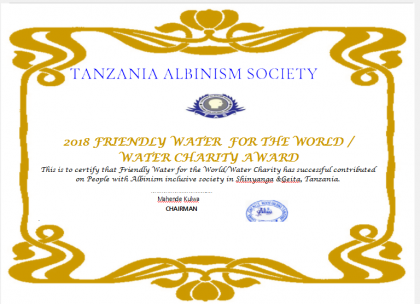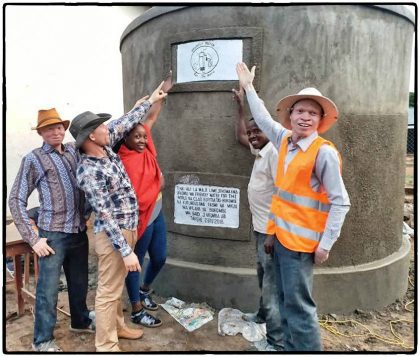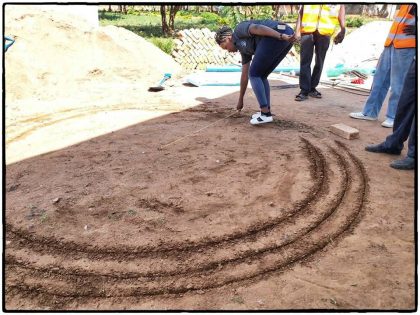Working with People with Albinism in Tanzania
Training to help the residents of Albinism Communities solve their water & sanitation issues across 13 communities across Tanzania.
This project is made possible through the partnership of WATER CHARITY and the NATIONAL PEACE CORPS ASSOCIATION. ![]()
This ambitious program to help the Albinism Communities of Tanzania is still ongoing, but the first few trainings have been accomplished successfully. To read reports from the field, scroll down below.
Water Charity, in partnership with our friends at Friendly Water For The World, is conducting a series of training in a variety of water, hygiene, sanitation, and health areas which will impart the recipients with useable skills that will make their lives easier, and impact their health tremendously. Training includes Rainwater Catchment, Water Tank Construction (using Interlocking Stabilized Soil Brick technology), Microflush Toilets, Permagarden Instruction, Soap Manufacture, and Water Filter Construction. Upon completion of training, not only will they have finished products to use, but they will have the ability to teach others, and spread the techniques.
There are 13 communities of people with albinism in Tanzania, and this program aims to spread these technologies to all of them, as they are easily one of the most impacted and disenfranchised groups on the planet. The program begins with training in 2 of the 13 communities, and builds upon the foundation of BioSand Filter Construction trainings that have already been completed successfully, and are already increasing the physical security and water security of the people, as they were in extreme danger when they had to leave the protection of their communities to seek for water.
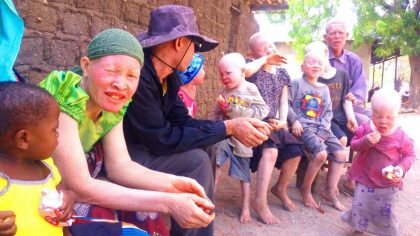 Basic Information
Basic Information
People with albinism are found throughout Africa, especially in the eastern and central regions. A lack of skin pigmentation (melanin) – a genetic condition – results in people appearing white (actually pinkish), with skin burning easily in the equatorial sun, and often with severely impaired eyesight. The physical condition would itself be difficult enough to manage – long clothes, hats, body lotions, strong eyeglasses – but worse is the social situation in which people with albinism find themselves.
People with albinism in Tanzania live in constant fear. They are hunted, killed, and dismembered, especially by those in fishing and mining communities. Witchdoctors teach these communities to believe that possession of bones and body parts from people with albinism can lead to wealth. More than 100 people with albinism are killed and gruesomely mutilated in Tanzania each year. It should be noted that many are killed while walking to gather water for their households. There is also a myth that sex (i.e. rape) with a woman, boy, or girl with albinism is a cure for HIV – hence, many of those raped are infected with the disease.
Since they have no way of protecting them in their own communities, the Tanzania government has chosen to collect people with albinism in camps, where they receive very minimal aid from other community-based or non-governmental organizations.
Shinyanga is one of five regions in the Lake Zone of northern Tanzania. There are some 2,700 people living with albinism in the area; the family count is larger, because many families with children with albinism may not be people with albinism themselves. 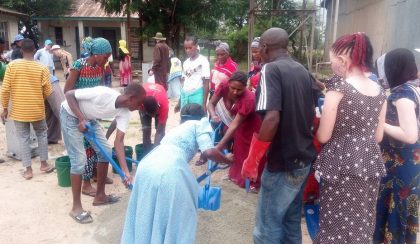 Conditions in the camp are brutal. Unemployment is virtually 100%. People are constantly sick, there is massive water scarcity, and it was not unheard of for people to walk 15 kilometers roundtrip to find water. There have been attacks on people with albinism when going for water, or simply using the bushes to relieve themselves. There are no toilets. Typhoid and bacterial dysentery are common and almost universal. Life expectancy is short.
Conditions in the camp are brutal. Unemployment is virtually 100%. People are constantly sick, there is massive water scarcity, and it was not unheard of for people to walk 15 kilometers roundtrip to find water. There have been attacks on people with albinism when going for water, or simply using the bushes to relieve themselves. There are no toilets. Typhoid and bacterial dysentery are common and almost universal. Life expectancy is short.
The Project
The program we have developed contains projects implemented in four stages. The first, now completed, provided training in the manufacture, distribution, installation, and maintenance of BioSand Filters. This made it possible for two groups of people to set up small enterprises to sell the Filters while providing clean water for their own families and community. More than 500 have already been sold! This is the first effort to help reintegrate people with albinism into the larger community, as they have become the only available source of clean water technologies. Profits are now being used to spin off other small enterprises, such as chicken and goat raising or sewing projects. And the improvement in health has been extraordinary!
The second step will be to train people with albinism to build rainwater catchment systems/Ferro-cement tanks. First, we will train and equip two teams to fabricate interlocking bricks, which will be used for the foundations of the catchments (and for the MicroFlush toilets – see below.) The bricks can also be sold into the community to assist with housing needs. Then we will train two teams of people with albinism to build the catchment systems. The newly available water will substantially reduce the ‘long walk to water’ for many people with albinism and hence eliminate they’re being hunted in the process, while at the same providing employment and a path to self-sufficiency. Water can also be sold, increasing economic opportunity.
The third stage will be teaching people with albinism to build MicroFlush toilets. MicroFlush toilets are simple, very inexpensive, composting toilets, that make use of worms, and require an only one-quarter cup of water peruse. They do not have to be mucked out for two-and-a-half years and are very simple to fabricate.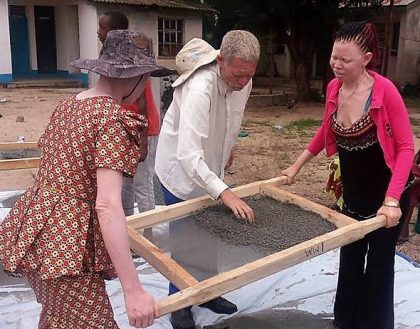 Two more businesses will be created.
Two more businesses will be created.
Teams in Shinyanga and Geita will also be trained to manufacture and market Friendly Soap – a simple liquid soap that does not require palm oil (and hence the destruction of palm trees in the process).
Finally, Water Charity trainers will teach the communities advanced, yet simple to implement, agricultural methodologies known as Permagarden Technique. Water used for growing food accounts for the majority of any community’s water usage. Therefore, teaching people to get more food for less water, while also replenishing their aquifers and keeping the valuable topsoil from being washed away makes a huge difference. It simultaneously addresses food & water scarcity and improves the economic situation of the farmers in the process. This effort has been forwarded by a concerted training effort to train the people with albinism directly, as well as a group of HIV-positive volunteers who can take this training to the various communities, whereas the albinism community members themselves are unable to travel in this way. See this effort unfolding here: https://watercharity.vps.webdock.cloud/permagarden-training-program-mwanza-and-shinyanga-regions-tanzania
The program also includes Microfinance and Business Training aspects which will be handled by our partners.
The overall result will be an integrated program for people with albinism, the very first of its kind, with significant enhancements in both water availability and water quality, and improvements in community sanitation and hygiene. It will remove some of the risks faced by people with albinism by people who are hunting them. It will also provide for job creation and self-sufficiency, and the opportunity for people with albinism to work with members of other communities, a significant step towards the removal of stereotypes. The health of children will be improved, enabling them to attend school more regularly, as many of them will no longer be taken out of school to walk for water.
Word of this program has spread. Local government officials and leaders of people with albinism communities all over the country are contacting our local affiliate. In addition, the Office of the President of Tanzania has requested that all local governments cooperate and collaborate with our efforts to ensure clean water for people with albinism throughout the country.
Become part of the campaign. This program has been paid for in its entirety by Water Charity out of pocket, so by adopting parts of it and helping us recoup the funds we have expended, you allow us to expand this work and spread this training to other communities.
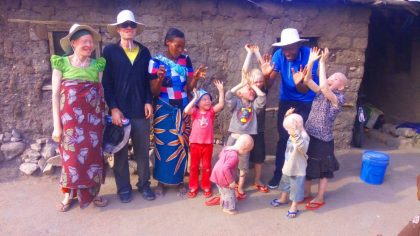
Updates From The People With Albinism Communities Program – Tanzania
Following this, you will find a continuing stream of updates from this very important program. The Albinism Communities of Tanzania are some of the most impacted anywhere, and the work we are engaged in there is far-reaching. There are many further trainings and assistance projects that are to be done until we have managed to help all 13 of these communities. As new updates from the field come in, we will post them here.
To know more about this project, CLICK HERE, or scroll back to the top of this page.
David Reports:
Jambo Rafiki ,I sent many pictures so that you may choose the most one for you to use, the ceremony was so fun, our project was leading the first number than all that presented there, and the way it helps the community to get safe and clean water, and also earning money, another is that there are no lies for what we doing so I am sending this greeting to FW, CLAO For their wishes to work with people of Shinyanga, third the project seems to put people together especially people with Albinism who perished away by stereotype and segregated from the community, other thanks to FW from the government is how you helps People with Albinism to work since they were not thought to work for their own risk. May you please receive all these thanks from The National Leader of UHURU TORCH EXHIBITION. And the other leader from the local government.


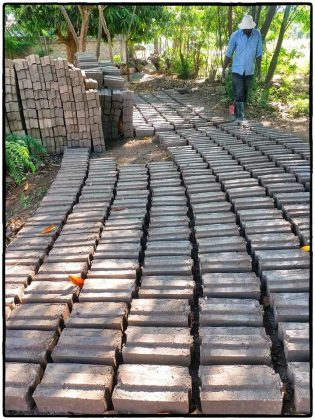 Challenges, people with Albinism faced many challenges such as market to sell filter this is due to lack of awareness from the community due to primitive and illiteracy of people, another challenge is how to transport the filter from one place to the customers, this is seemed big problem to them due to geographical of the area and fearness due to local beliefs, and so on. The way to overcome the problem still challenges. This is what happened to Shinyanga.
Challenges, people with Albinism faced many challenges such as market to sell filter this is due to lack of awareness from the community due to primitive and illiteracy of people, another challenge is how to transport the filter from one place to the customers, this is seemed big problem to them due to geographical of the area and fearness due to local beliefs, and so on. The way to overcome the problem still challenges. This is what happened to Shinyanga.
It’s amazing! Following the training of the two people with albinism groups in interlocking brick making, the training in rainwater catchments has gone fabulously!
In Bukombe, Geita, where all these tank photos are from, local government officials visited every day, and also provided police protection for the people with albinism. They were so pleased with the work, that they provided a land grant to CLAO and the people with albinism as a center for them to organize and continue their work.
As noted below, other than our folks (CLAO and the Tanzania Albinism Society), no NGOs come to Geita. We are what they’ve got!
“Ofsini Kwa mkuu wa wilaya ya Bukombe inapendeza. “Thank you for visiting us at bukombe district in Geita, we are inspired by your coming because geographically bukombe is a district which is far away from the city since many stakeholders cannot come because of the remoteness of our district, the coming of CLAO with Friendly water projects it is grace for us. Thank you for your coming, I assure you security and any assistance you will need.” words of Hon. Said Nkomba the District commissioner of Bukomba when he invited us to his office today.
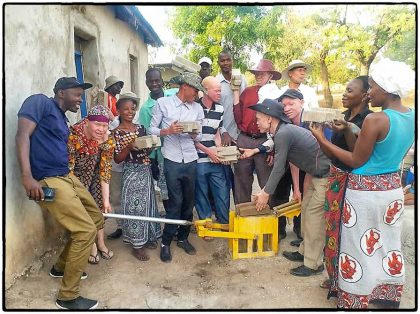
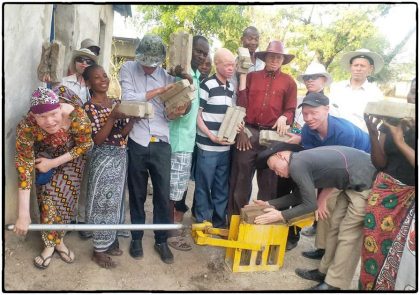
Updates From The People With Albinism Communities Program – Shinyanga Tanzania
Our bio-sand training has been extremely successful in Eastern Africa, with many people trained and now distributing filters.
Kenedy Reports:
You folks funded the catchment training in Uzima, for the people with HIV. Those trained turned around and have now completed training people with Albinism, in Shinyanga and Geita, which you also funded.
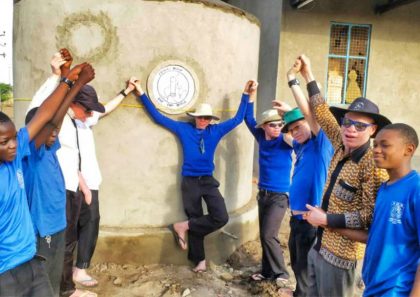
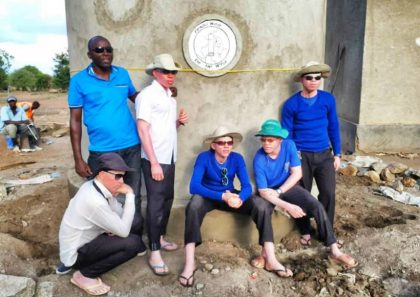
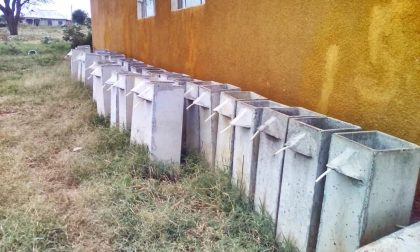
THE PROJECTS ACHIEVEMENTS IN GEITA AND SHINYANGA
A thank you note/update:
Tanzania Albinism Society (TAS) has great pleasure and thanks to informing you that the Bio Sand water filters, Interlocking bricks, rainwater catchment tanks, and micro flush toilet projects planted the tremendous attitudinal changes to the marginalized people with albinism in our community.TAS appreciates CLAO, FRIENDLY WATER, and WATER CHARITY for your special support to people with albinism. Also, we give great thanks to Kenedy and Obed for their great efforts in building the new inclusive society.
People with albinism in Tanzania live life in great tension, particularly in the lake and western zone of the country – especially in Tabora, Shinyanga, Simiyu, Geita, Mwanza, Kigoma, Kagera and Mara region. These are the regions where there is the largest number of people with albinism. The community believes that this group of people has miracles and supernatural power which lead to someone to live in the prosperous life by using people with albinism body parts like hair, tongue, skin in the witchcraft ways. This situation led to the killings of people with albinism where about 76 people with albinism were killed from 2006 to 2016. Many children with albinism were taken and still been taken to temporary centers for security. Even elders with albinism also some of them denied by their relatives hence stay in these temporary centers. Many children with albinism miss education through school dropout, fear of been kidnapped and family separation.
In Geita and Shinyanga, the four projects brought many achievements in 2018 including the use of clean and safe water, reduction of epidemic diseases like diarrhea due to poor (or lack of) toilets in the families, and generation of income through selling filters that becomes the job opportunities to us as well as interlocking bricks, health improvement where the water illness clinic attendant reduced to 96%, family security increase where family members do not walk a long distance for water due to the use of rainwater catchment tanks.
Also, from these projects, local government leaders are supporting people with albinism by funding the projects for sustainability. In Shinyanga, the government-funded six hundred thousand Tanzania Shillings (3000 US Dollars) for the Biosand water filters. Also, they ordered 200 filters for all primary schools in the academic year of 2019, and the groups already fabricated the filters which will be bought by the district government for the pupils in schools in January 2019. In Geita, people with albinism have been given their office and the place for all the projects from FRIENDLY WATER and WATER CHARITY. The police leaders also do ensure full security for people with albinism in their activities.
Therefore, the dream for an inclusive society was realized within the year of 2018. The situation of most children with albinism was critical due to the unique factors of their community’s socio-economic, cultural, traditional and developmental circumstances, natural disasters, armed conflicts, exploitation and hunger, and on account of the child’s physical and mental immaturity he/she needs special safeguards and care. From this point of view, many people with albinism remain uneducated, rejected, isolated and dependent. We hope that this will continue to improve due to the work you are doing.
Recommendation
It is my hope that CLAO/FRIENDLY WATER/WATER CHARITY will be our major stakeholders in building the community to be the cool, safe and peaceful place for the people with albinism to live through entrepreneurship supports. And so doing, I do recommend that in 2019, CLAO/FWFW/WC should expand the project areas to the other parts of the country where there is a camp with people with albinism in Tanzania than to the two districts from Shinyanga and Geita because it will create a good environment for them to the society, security, reduce water illness, reduce the spread of HIV/AIDS as well as job creation opportunity, and the years 2019 is the year towards the general election of 2020 in Tanzania where some people believe on the use of witchcraft.
